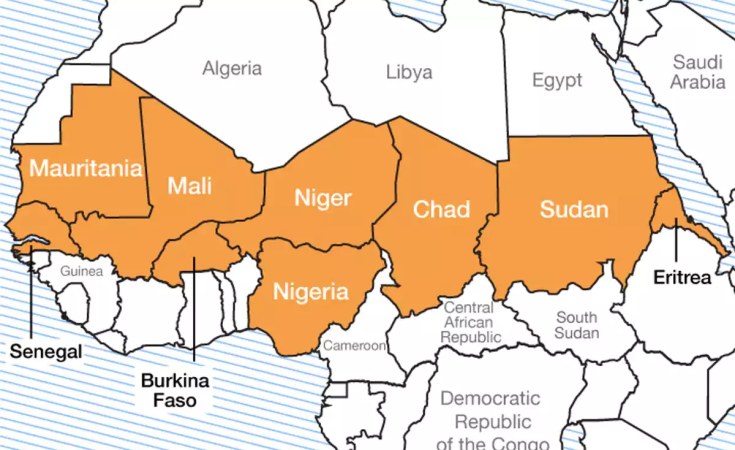By its geostrategic dimension and the states engaged, openly or not, the war in Ukraine has relegated all other conflicts in the world to the... third level. This is even truer of the war that has been devastating the Sahel, in particular Mali, since 2012. That inattentive negligence is already having a heavy price in the Sahel and especially at populations and infrastructures levels as well as weakening already fragmented national cohesions. The cost for the other regions of the world - in particular Europe, the United States and Russia - full-bodied by social networks and propaganda worthy of Cold War practices, could be enormous, particularly in terms of diplomatic relations, migrations and illicit trafficking. With these realities in place, can the Sahel still cope and if so, how?
Careless negligence.
Insecurity in the Sahel - that vast space delimited West to East, from the Atlantic coasts to those of the Red Sea and, North to South, from southern Maghreb to the Savannah - exploded more than a decade and a half ago. It was in 2005 following multiple armed attacks in this strip extending over 3,300 km west to east and 1,600 km from north to south. Their most striking causes were and remain: the border populations vulnerability, victims of long years of drought, the massive return of ex-combatants from Afghanistan proud and strong of their jihadist journey, governance often dominated by the culture of the one party system and its tribal and unpunished corruption. In 2011, the Libyan crisis worsened the Sahel situation by pouring more weapons into the region and by facilitating various trafficking, including that of drugs.
Insecurity took root and spread. One point is well known: the longer a conflict lasts, the more it strengthens from its own and various damages. The Sahel is a perfect illustration of that. Since 2013, the number of deaths, injuries and destruction of physical infrastructure has continued to increase. That of the refugees exploded. Worse, the attacks launched by the main rebel groups - the Macina Liberation Front, FLM; the Jema'at Al Islam Wal Mouslimin, JNIM, and the Islamic State in the Greater Sahara, EIGS, are increasingly professional, that is to say technically better organized and politically more targeted to further discredit governments. The latest assault against the barracks town of Kati, near Bamako, is a dangerous illustration of that.
These attacks, including in Burkina Faso, Niger and elsewhere, seem to be held back only by the violent internal wars between ISGS and its two other rival movements. The massacres of civilians and the wars between terrorist groups themselves do not prevent the latter from forcing the support of tribes and villages' communities. Despite these contradictions, their strategy remains the mobilization of all against the central governments. For now, when not refugees or internally displaced, populations have little choice.
Beyond humanitarian assistance, the courageous presence of UN agencies and NGOs is also that of neutral and therefore embarrassing witnesses against the oppressors. However, the nagging anguish that haunts the populations is: "how long will this atrocious ordeal of massacres, destruction and uncertainty last?" How to get out of it?
Can the Sahel pull through?
In this suffocating context, the old adage is confirmed: "misfortune never comes alone". The various and multiple damages due to protracted insecurity and its disastrous consequences are aggravated by climate change. The cycles of extreme droughts, followed by exceptionally heavy rains and floods, are countless. Food insecurity, now chronic, is no longer experienced as an intolerable anomaly. In front of it, governments, even the most voluntary, find themselves disarmed. The exodus to provincial and national capitals, already overcrowded, expensive and poorly organized, fuels further insecurity and interstates migration. In a region where carbon emissions are globally less than 0.13%, compared to more than 75% in the Group of 20 countries, the question of international compensation, "who pollutes pays", becomes more logical. Faced with so many challenges - scarcity of water but abundant and violent rains, desertification, threats to biodiversity and erosion of the Atlantic coasts - what will the next COP 27, scheduled for November in Egypt, announce or offer to the Sahel?
In this desperate environment, especially for the unemployed youth, the FLM groups of the JNIM and especially the EIGS enjoy several steps ahead of certain governments. More present on the ground than the national administrations, they fuse with the populations through pressure, threats, recruitment and more or less forced marriages. Playing on resentments, they seek and sometimes succeed in isolating citizens and alienating them further from governments. Often too distant physically and especially politically!
Were it not for their deadly rivalries - the EIGS against all others - and its true leaders' ignorance of local cultures, they could have controlled more geographical and political spaces. Their objective, reaching the Gulf of Guinea, would already have been achieved.
Still, the Sahel countries can and must get through. For that, an internal effort is necessary. Indeed, beyond its well-known causes, terrorist progression in space and in people's minds cannot be totally dissociated from recent national policies more focused on the past than on the present and above all ignoring the future. The "retribalisation" or gradual deconstruction of states, almost united at independence in 1960, threatens national cohesions. The new priorities given to anti-colonial resistance in the region are dividing populations and moving away from the strategic objectives of national integration and development.
In fine, worse, these new ideologies legitimize, without necessarily wanting it, terrorists' fight for a new order. Thus, they prevent the Sahel from being an actor of its future and not simply a subject of concern or a continual source of instability to the world. However, refugees voices crying in the desert are not enough compared to the war in Ukraine...
Ahmedou Ould Abdallah, president centre4s.org


